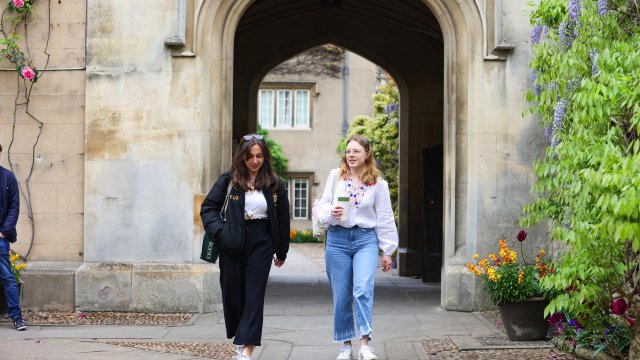With an intimate atmosphere and broad language coverage, Sidney is a great place to study Modern and Medieval Languages at Cambridge.
Important Note Concerning Interviews for 2024
Please note, all undergraduate admissions interviews at Sidney Sussex for the 2024-25 admissions round will be held online. Further details regarding interview platform will follow.
A Modern and Medieval Languages degree lets you study the world – and lets you get especially close to the cultures and peoples of other places – through the knowledge of their languages. It is perhaps one of the most interdisciplinary and flexible subjects offered at Cambridge, with the opportunity for students not just to acquire extremely high-level language skills, but also to broaden their knowledge in literature, film, politics, art, history and philosophy. Sidney students in particular are encouraged to take advantage of such opportunities – alongside an in-depth study of two major foreign languages (French, German, Italian, Portuguese, Russian and Spanish), recent students have taken options in Polish, Ukrainian, Dutch, Catalan, contemporary Latin American culture, Romance Linguistics or European film, to name a few.
Sidney linguists benefit from a thriving and welcoming community, both at undergraduate and graduate level. Staff-student relations are notably friendly, with a whole host of events and activities providing students and Fellows alike with opportunities to mix more informally.
Undergraduate Study
We offer undergraduate degree courses in Modern and Medieval Languages, Linguistics, and, jointly with the Faculty of History, in History and Modern Languages. These are rich, intellectually rewarding fields, through which your degree course may chart one of many diverse routes, all fostering skills that are highly sought after by top employers in many fields.
The Modern and Medieval Languages Tripos requires the study of two languages chosen from French, German, Italian, Portuguese, Russian and Spanish. Both languages may be studied from A-level standard, or one language from A-level standard may be combined with a language you have not previously studied (or have studied to a lower level, such as GCSE). French can only be studied from A-level standard. Any one of these languages may, alternatively, be combined with Classical Latin or Classical Greek. It is possible to combine one of the modern languages listed with certain Middle Eastern languages (e.g. Arabic and Hebrew) in the Asian and Middle Eastern Studies course.
Modern Languages undergraduates at Sidney are part of a close-knit community, with a lot of interaction and support between the different year groups. We admit between six and eight undergraduates each year, making us a medium-sized College for the subject. Sidney welcomes applications for any of the languages available in the Modern and Medieval Languages course.
In a subject with great breadth like Modern Languages, there are many things you can do to prepare your application. With the help of your teachers, your local library and the internet, you could follow up on the current affairs of different countries that interest you and get a sense of their history and social context, search for free online language learning resources, try to read in the foreign language (bilingual readers could be useful) and watch films, get a study buddy to exchange conversation, or use apps like Duolinguo.
- Written work
Two pieces of written work prior to interview. You will not need to write anything new specially for this.
- Admissions assessments
If you’re shortlisted for interview, you may need to take a written assessment. Please check back in April 2024 for details. If an assessment is required, you will not need to register in advance and we will provide details directly to you.
- Interviews
- All undergraduate admissions interviews at Sidney Sussex for the 2024-25 admissions round will be held online. Further details regarding interview platform will follow.
- Two interviews. These will each focus on one of your chosen languages, and there will be a short passage to read for 15 minutes before each interview. For languages studied at A-level, the passage will be in the target language, and you will be expected to speak in the language for part (but not all) of the interview. For ab initio languages, the passage will be in English.
- Subject requirements
- Learn about our standard entry requirements for Modern and Medieval Languages on the University website.
- Please note that offers are set on an individual basis using all of the information available to us in context of the entire field of applicants.
- Beyond the syllabus
Are you excited to learn more about the subject by delving beyond the school syllabus? Explore our Beyond the syllabus resource hub to discover interesting websites, podcasts, videos, and books related to the subject you love!
Typical undergraduate intake each year
3 - 6
Typical A-level offer
A*AA
Typical IB offer
41-42 points overall, with 776 at Higher Level
Postgraduate Study
Sidney offers a friendly, diverse and inclusive environment for postgraduate study in Modern and Medieval Languages and Linguistics, including various structured opportunities for cross-disciplinary inspiration.
MPhil programmes include Theoretical and Applied Linguistics, European and Latin American Comparative Literatures and Cultures, and Film and Screen Studies, whereas doctoral programmes range across the breadth of the subject.
All University of Cambridge applications for postgraduate study are processed centrally by the Postgraduate Admissions Office. The application form and supporting documents are submitted electronically via their website and the online self-service system, though academic decisions on applications are made by the Faculty or Department.
- Funding
There are many funding opportunities at Cambridge from a wide variety of sources including the Cambridge Trust, Gates Cambridge, Colleges, Departments, Research Councils and central University funds. You can use the Postgraduate Admissions' Cambridge Funding Search to find out which type of funding you might be eligible for, and how and when to apply. They also operate a Postgraduate Funding Competition to co-ordinate some of these funding opportunities and make the process easier for you as an applicant.
To find information about the funds available for postgraduate students at Sidney, visit our Studentships and funding page.
- Useful links
Course directory | Postgraduate Admissions | University of Cambridge
Funding | Postgraduate Admissions | University of Cambridge
How do I apply? | Postgraduate Admissions | University of Cambridge
International students | Postgraduate Admissions | University of Cambridge
Opportunities to work, travel and study
MML students spend their third year abroad in one of three ways: they attend a foreign university, become an English-speaking assistant at a school, or in employment (which may be paid or unpaid). In the past, some Sidney students have:
- completed an internship at the Hermitage Museum in St Petersburg
- studied Philosophy at the Sorbonne in Paris
- worked at the British Chamber of Commerce in Madrid
- undertaken film studies in Rome
- taught English at the Universidad Chileno-Británica de Cultura in Santiago de Chile
- volunteered for an NGO in Porto Alegre, southern Brazil
- worked as a translator in Berlin
You have great freedom and flexibility (and support from the Faculty Year Abroad Office and your Director of Studies at Sidney) in making your plans: you can tailor your third year abroad to suit your own interests and later career goals, providing you spend at least eight months abroad and are constantly immersed in one of the foreign languages you’re studying. If you wish you can split the year between two countries, spending at least three months in any one country and a total of at least eight months abroad.
Discover more on our Opportunities to work, travel, and study page.


